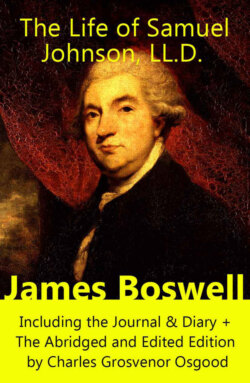Читать книгу The Life of Samuel Johnson, LL.D. - James Boswell - Страница 250
На сайте Литреса книга снята с продажи.
‘DEAR SIR,
Оглавление‘I am lately returned from Staffordshire and Derbyshire. The last letter mentions two others which you have written to me since you received my pamphlet. Of these two I never had but one, in which you mentioned a design of visiting Scotland, and, by consequence, put my journey to Langton out of my thoughts. My summer wanderings are now over, and I am engaging in a very great work, the revision of my Dictionary[420]; from which I know not, at present, how to get loose.
‘If you have observed, or been told, any errours or omissions, you will do me a great favour by letting me know them.
‘Lady Rothes, I find, has disappointed you and herself. Ladies will have these tricks. The Queen and Mrs. Thrale, both ladies of experience, yet both missed their reckoning this summer. I hope, a few months will recompence your uneasiness.
‘Please to tell Lady Rothes how highly I value the honour of her invitation, which it is my purpose to obey as soon as I have disengaged myself. In the mean time I shall hope to hear often of her Ladyship, and every day better news and better, till I hear that you have both the happiness, which to both is very sincerely wished, by, Sir,
‘Your most affectionate, and
‘Most humble servant,
‘SAM. JOHNSON.’
‘August 29, 1771.’
In October I again wrote to him, thanking him for his last letter, and his obliging reception of Mr. Beattie; informing him that I had been at Alnwick lately, and had good accounts of him from Dr. Percy.
In his religious record of this year, we observe that he was better than usual, both in body and mind, and better satisfied with the regularity of his conduct[421]. But he is still ‘trying his ways’[422] too rigorously. He charges himself with not rising early enough; yet he mentions what was surely a sufficient excuse for this, supposing it to be a duty seriously required, as he all his life appears to have thought it. ‘One great hindrance is want of rest; my nocturnal complaints grow less troublesome towards morning; and I am tempted to repair the deficiencies of the night[423].’ Alas! how hard would it be if this indulgence were to be imputed to a sick man as a crime. In his retrospect on the following Easter-Eve, he says, ‘When I review the last year, I am able to recollect so little done, that shame and sorrow, though perhaps too weakly, come upon me.’ Had he been judging of any one else in the same circumstances, how clear would he have been on the favourable side. How very difficult, and in my opinion almost constitutionally impossible it was for him to be raised early, even by the strongest resolutions, appears from a note in one of his little paper-books, (containing words arranged for his Dictionary,) written, I suppose, about 1753: ‘I do not remember that since I left Oxford I ever rose early by mere choice, but once or twice at Edial, and two or three times for the Rambler.’ I think he had fair ground enough to have quieted his mind on this subject, by concluding that he was physically incapable of what is at best but a commodious regulation.
In 1772 he was altogether quiescent as an authour[424]; but it will be found from the various evidences which I shall bring together that his mind was acute, lively, and vigorous.
‘To SIR JOSHUA REYNOLDS.
